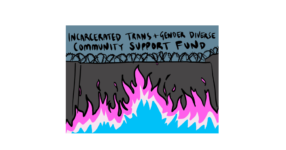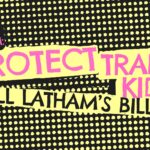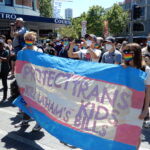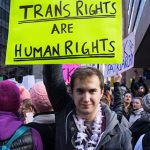The Incarcerated Trans and Gender Diverse Community Fund: A Chat With Witt Gorrie

A fund to provide support for trans and gender diverse inmates appeared online on 7 October, and within a week it had reached its goal of $30,000. And as the donations have only continued to climb, the organisers’ aim to establish the support as ongoing has been confirmed.
The Incarcerated Trans and Gender Diverse Community Fund aims to provide transgender and gender diverse inmates with both financial and material support, whilst they’re caught in a correctional system that will readily lock them up, but then fail to address their needs.
Despite correctional policies that state otherwise, jurisdictions nationwide continue to imprison trans people in facilities that don’t align with their identified gender, like CJ Palmer, who in 2018, was incarcerated in a male maximum security prison in WA, under prolonged solitary confinement.
“Overwhelmed and grateful”
Another case of misgendered incarceration took place in this state in 2009, when trans woman Veronica Baxter was remanded in Silverwater Prison. The 34-year-old Aboriginal woman tragically took her own life within 48 hours of entering the correctional facility.
Indeed, the overincarceration of First Nations people in this country is stark. And as social worker Witt Gorrie explains the fund has a special focus on Aboriginal and Torres Strait Islander transgender inmates, who face “multiple forms of oppression” inside.
Sydney Criminal Lawyers spoke to Incarcerated TGD Community Fund organiser Witt Gorrie about the authorities placing trans women in male prisons, how those outside can apply for assistance for those on the inside, and the reaction inmates are having on learning of the great swell of support.
Firstly, you’ve just launched the Incarcerated Trans and Gender Diverse Community Fund. Witt, why is there a need for it?
It’s a fund specifically for trans and gender diverse people, who are criminalised, incarcerated or those returning home to their communities – post release support. The fund is there to provide financial and material aid to these people.
I’m a social worker, who supports trans people in Victoria. I’ve done so in Queensland as well. So, I’ve seen the impacts of prison for trans and gender diverse people firsthand.
There are unique issues that trans and gender diverse people face inside, and when they’re trying to get released.
A big focus of the fund is to provide support for people while inside, but also to keep people from going into prison, and from going back into prison.
The majority of trans people in prison are overwhelmingly women.
The fund also has a special focus on First Nations trans and gender diverse prisoners. Why’s that the case?
Like the rest of the prison population, we see an overrepresentation of Aboriginal and Torres Strait Islander trans women, or Sistergirls, in this country’s prisons.
An important part of looking at the experience for trans people is understanding it through an intersectional lens.
When we look at those who are the most disadvantaged, for Aboriginal and Torres Strait Islander trans people in particular, there’s multiple forms of oppression impacting.
It’s a combination of transphobia, sexism, white supremacy and racism, all combining with the experience of being criminalised.
So, we take an approach centring on those multiple forms of oppression, as well as the overrepresentation of Aboriginal and Torres Strait Islander people in the prison system, and the targeting of them by the legal system in Australia.
There is a big focus for those reasons.
We recently ran an article on the 2009 death in custody of Veronica Baxter in NSW. She was an Aboriginal transgender woman placed in an all-male remand centre, where she took her own life.
In your understanding, what sort of impacts does the placing of trans women in male correctional facilities have?
The majority of trans women are in men’s prisons in Australia. Almost every single trans woman inmate in Victoria is in a men’s prison.
This is despite many states having policies that state otherwise. These policies don’t seem to play out in practice.
What we see when women are placed in men’s prisons is there’s a very high and daily risk of different forms of violence: physical, psychological and sexual.
These women are at risk of this all the time. And they’re continuing to be placed in this risk by being placed in men’s prisons.
From my conversations with people in other states, it’s the same story: trans women continue to be placed in men’s prisons.
What are some of the other issues that trans and gender diverse inmates face that are specific to them?
When looking at trans people, and in particular Aboriginal trans women and trans women of colour, in the community, there’s a lot of structural barriers in terms of employment, housing and healthcare, as well as high rates of violence.
When you look at the experience of prison for a trans person, all of those aspects come into play and they’re amplified.
A lot of trans people enter the prison system already experiencing homelessness or poverty. They come into prison with very little resources. Many trans people are estranged and disconnected from family because of transphobia.
In terms of support inside, it’s very minimal for a lot of trans people. Certainly, this can be the case for people who aren’t trans as well, but a lot of trans people don’t have family to assist them with money for the phone or mail.
A lot of trans people have very little resources or support inside.
Prison is isolating for everyone, but it can be the next level of isolation for a trans person, particularly if they’re in a prison of the gender they don’t identify as. So, if you are a woman surrounded by men, the isolation is extreme.
One of the core aspects of this fund is to build support around people inside through the assistance of resources, breaking down some of the isolation that people are feeling and letting them know that people in the community do care.
I spoke to four trans women inside today and everyone I spoke to was overwhelmed. One of the women was in tears, she couldn’t believe that this level of support existed in the community. They were all overwhelmed and grateful.
And lastly, Witt, you only launched the fund recently. It had a $30,000 goal, which it surpassed within its first week. What are your plans from here?
The aim of the fund was to kick start it into being an ongoing support for trans people in prison and coming out.
The aim is to build things from here, establish the fund and get it out there in the community and let people inside know.
There’s a form that someone on the outside can use to request aid on behalf of someone on the inside.
It then goes to a committee to approve. There’s six on the committee, and everyone identifies as trans or gender diverse.
Some people on the committee have lived experience of prison. Some have been impacted by the prison-industrial complex in other ways. And some of us are support workers.
We also want to get the word out to lawyers. We’ve spoken to lawyers, who’ve said it has been really hard to get bail for a lot of trans people, because there’s no appropriate accommodation available.
There’s a big problem with obtaining safe accommodation, especially for trans women. A lot of the accommodation is really unsafe if it is mixed accommodation.
There’s work to be done in the women’s housing sector in terms of ensuring trans women are included in the sector and can access those resources.
So, the aim of the fund is for it to be an ongoing support for trans and gender diverse people.







